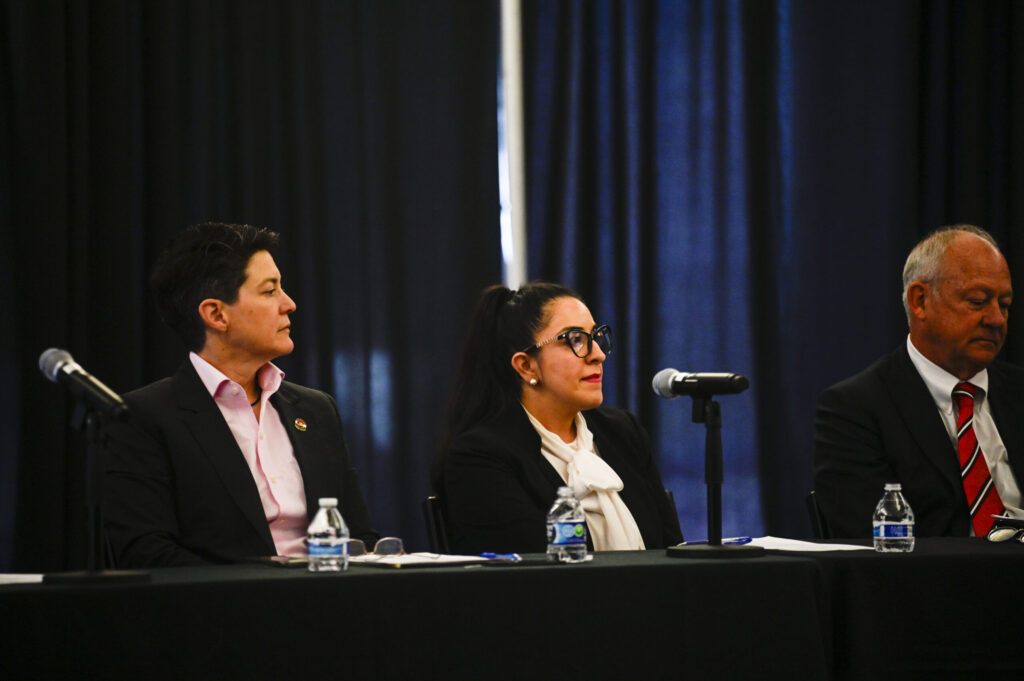State Supreme Court term in review, update on federal judges’ ‘hearings’ | COURT CRAWL
Welcome to Court Crawl, Colorado Politics’ roundup of news from the third branch of government.
The state Supreme Court’s 2024-2025 term had some interesting developments, plus two federal judges have adjusted their terminology to better describe what they’re doing.
Supreme Court term in review
• The Colorado Supreme Court issued opinions in 70 cases between July 2024 and June 2025, which was slightly fewer than the prior year. The court took the unusual step of rescinding one decision, plus it dismissed two appeals and decided the legal issue via a rule change instead. Lawmakers also acted quickly in response to one decision, overruling the court with new legislation in a matter of weeks.
• Among the statistical highlights: Justice Richard L. Gabriel wrote the most and dissented the most, while the split between unanimous and dissenting opinions was largely the same as the prior term. For more, read Colorado Politics’ recent cover story.
Heard on appeal
• Although the judges complained about overly broad search warrants served on cell phone providers, the state’s Court of Appeals instead overturned a man’s carjacking-related convictions due to an evidentiary error.
• The Court of Appeals noted the government misunderstood the scope of a recent Colorado Supreme Court decision, and clarified a father doesn’t have to prove the nature of his relationship with his biological children when challenging a no-contact order.
• Lakewood must release partially blurred body-worn camera footage of a fatal shooting, regardless of the wishes of the deceased’s family.
• Two Boulder County residents don’t have standing to try and reinstate the county’s ban on firearm discharge on federal land adjacent to their homes, the Court of Appeals decided.
• The Court of Appeals reminded trial judges they have to advise defendants of their right to appear in person prior to conducting a virtual sentencing hearing.
• A victim’s identification of the perpetrator was unreliable in part due to an investigator’s influence, the Court of Appeals ruled in reversing the defendant’s convictions.
• An Arapahoe County judge incorrectly prevented a murder defendant from testifying about evidence that suggested he acted in self-defense.
In federal news
• The U.S. Court of Appeals for the 10th Circuit ruled that a child welfare worker can’t be liable for any statements she made as a witness in court, even if they were false, but she can be liable for what she said elsewhere in the neglect proceedings.
• The 10th Circuit ordered a trial judge to reconsider his decision denying immunity to Denver police officers who arrested a man for recording video at a police station.
• A jury will decide whether Denver Health staff provided adequate care to a deceased jail detainee, or whether they knew about and disregarded his serious condition.
• A federal judge delineated which plaintiffs may challenge which portions of which local government’s gun regulations, in an ongoing lawsuit against Boulder County and three of its municipalities.
• A federal judge had harsh words for El Paso County leadership, even as he conceded they couldn’t be held liable for a mass shooting at an LGBTQ nightclub from 2022.
An update
• Readers may recall that earlier this month, Colorado Politics reported on the practice of two federal district judges who require lawyers in civil cases to meet with them prior to filing a motion for summary judgment. The judges, Regina M. Rodriguez and Charlotte N. Sweeney, were advertising these proceedings as “hearings,” even though they were actually conducting them as off-the-record, closed-doors conferences. Some attorneys and judges elsewhere were concerned about the implication that public hearings would be taking place.
• Since then, Rodriguez and Sweeney have adjusted their protocols to address the nomenclature issue. Although they aren’t explicitly described as off-the-record or in-chambers, the proceedings have now been labeled as “conferences” — or, in Sweeney’s case, “informal conferences.”
Vacancies and appointments
• The governor has appointed Springfield Mayor Tyler K. Gibson, who is also a business owner, restaurant employee and court visitor, to the Baca County Court, where he succeeds now-Morgan County Court Judge Lyudmyla “Milla” Lishchuk.
• There are two finalists to succeed now-District Court Judge Kimbra L. Killin in her previous role as a part-time Phillips County Court judge: Kimberlee R. Keleher and Holyoke Municipal Court Judge Tamara Irene Kelley.
Miscellaneous proceedings
• The Gazette has been following the trial of an Aurora dentist charged with murdering his wife. Here is some of the coverage:
Aurora dentist’s co-worker testifies against him in murder trial
Prosecutors allege James Craig injected his wife with cyanide as she lay dying in hospital
The twists and turns of Aurora dentist’s road to murder trial
• There are also new developments in the criminal case of a man charged with causing injuries — and now one fatality — to several demonstrators in Boulder last month:
Boulder attack suspect’s federal indictment could change following woman’s death
• The state Supreme Court’s judicial ethics panel advised that a municipal court is allowed to hire a part-time judge who also works as a state prosecutor.















